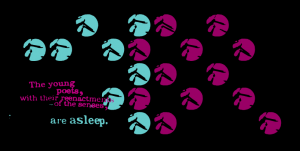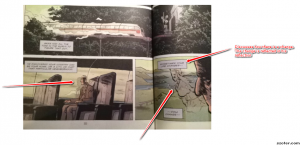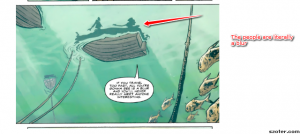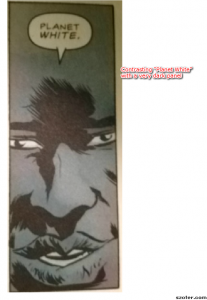Author Archives: Shane Stone
Final Presentation: The Downfall of Humanity
December 5th, 2013 | Posted by in Uncategorized - (0 Comments)As technology develops and becomes more and more advanced one question is evident. How will technology affect humanity? In an interview with Social Bling Rick Moss discusses how he has “two crazy ideas for saving humanity” and how he incorporated both of them into his novel, Ebocloud (Michele 2011). From the book, it appears that he is referring to how technology can save humanity. Moss speaks through Desalt to describe his two hypothesized ways. In reminiscing on a conversation with Arthur C. Clarke, Desalt explains how either a catastrophe will leave humanity to adapt physically to their new new circumstances (leaving technology obsolete) or that technology will “free us from ourselves [and our] physical bodies” (complete dependence on technology) (Moss 130). By the end of Ebocloud, humanity seems to be transitioning towards the latter extreme. According to Radu, his developments with the cloud will combine the micro (human) and macro (cloud) to create a meta structure, which will move “humans forward along their natural evolutionary pathway” (Moss 434). In the epilogue, Eli’s description of how “your [perception of] ‘me’ is blurred” during cloud connection suggests that humanity is on its way toward a meta-structure and one step closer to abandoning physical bodies (Moss 442). Despite the apparent positive advances of technology, there is still one critical downfall. Doug introduces the idea earlier in the novel when he expresses his concern about technology because he recognizes that “when we add something this big into our lives, we’re going to give up something equally big” (Moss 342). Although at the time it was unclear what “something” was going to be, upon the books conclusion the reader learns that traditional love is lost to a new form of ebolove. Advances in technology may have escalated humanity, but at a huge cost. With this in mind I leave the reader with a question: Is it worth it?
Moss, Rick. Ebocloud. 2nd ed. New Orleans: Aqueous, 2013. Print.
Moss, Rick. “EBOCLOUD: Dare to Imagine Life After Facebook | SocialBling: Social Workflow System Development.” Interview by Stephanie Michele. Web log post.SocialBling. N.p., 9 Mar. 2011. Web. 15 Nov. 2013. <http://www.socialbling.com/ebocloud-dare-to-imagine-life-after-facebook/>.
The Rise of Technology and Fall of Humanity
November 8th, 2013 | Posted by in Uncategorized - (0 Comments)Abstract:
According to Moore’s law the computing power of technology doubles every two years. Considering this, we are quickly approaching the time when the computational ability will be equivalent to human intelligence. With this time approaching, some questions arise. Will this increased ability increase human dependence on technology? If so, will there be a point when our dependence is our downfall? According to works of science fiction, the answer is yes. If this is the case, then we must determine at what point this is predicted to occur. To determine this I looked at science fiction novels and movies and see how the societies of fictional worlds became too dependent and what steps led up humanity’s downfall. Then I considered today’s technology, and how compared it to what is described in science fiction. Finally, I researched what today’s experts on singularity and related schools of thought feel about improvements in technology and how they’ll effect humanity. Taking all of this information, I determine an estimate for when our dependence on technology will betray us. To complement the written work, I have created physical timelines to help visualize what has occurred in science fiction novels. Additionally, I designed a program that provides the reader with a hypothetical situation and then asks the reader to determine what will happen as a result.
Electronic Literature Critique: Why do you stay up so late?
November 3rd, 2013 | Posted by in Uncategorized - (0 Comments)Why do you stay up so late? is a poem written by Marvin Bell that utilizes digital media to enhance the reading experience by augmenting the literary elements. In the poem, Bell uses traditional elements such as theme, conflict (internal), style, tone, and figurative language; he uses colors, sounds, and animations to compliment his words and heighten the meaning in his work. The sounds set the somber tone of the poem before the author’s words have the opportunity to create it. The animation of a lit match on the first page reminds the reader that it is late at night and there is very little light to work by.
Additionally, the hand tapping a pencil on the table is a visual of the author’s restlessness in attempting to write. The tapping makes the reader feel just as restless as the author, allowing the reader to sympathize with the author’s internal conflict. Also the animations visually represent the figurative language the author uses.
When the author describes the young poets and then transitions back to himself, the animation mirrors the transition by shifting from many tapping pencils to one tapping pencil.
The lone tapping continues until he says “I am frozen in the white page.” It is at this moment that the animation freezes, highlighting his conflict and figurative language.
Additionally, colors are used to set the scene as well as accent specific words and lines. For most of the poem, the words are set on a black background. It all changes with the appearance of the word “light”. The word is the only brightness on a dark surrounding because it is meant to be a single source of light that appears “through the ice.” This is followed by the screen flashing, and the background shifting to white. Here the sound maintains its repetitive beat, but the tone changes. This change creates a sense of optimism, but reminds the reader that things are still the same. This sentiment is echoed when the screen returns to a black background and Bell writes “this is not the story.” The contrast with colors and word selection is used throughout the poem as Bell sometimes highlights certain words by using different colors.
The affect that producing the poem in this form has is emphasized when you look at the poem in its pure html form. Here the reader finds a 24 line poem that when read does not touch us emotionally like the animated version does. Also, the animated version requires the reader to spend more time on the poem than one may necessarily spend reading it because you can only transition pages when the author allows. By using electronic literature as his medium, Bell is able to utilize multiple tools to create what traditional authors attempt to do with one. He creates the readers’ environment through manipulation of sounds, colors and time while traditional authors can only use words. Though critics may argue the latter is more difficult and therefore more impressive, the former assures that the reader experiences the environment the author intends.
Looking at how this contributes to the electronic literature conversation, I turn to the questions presented by Katherine Hayles in Electronic Literature: New Horizons for the Literary (2008).
1) “Is electronic literature really literature?” (Hayles 2008)
This question is difficult to answer because it depends on your definition of literature. Hayles has a more inclusive definition of electronic literature that includes work that that provides the reader with an experience (or gives meaning to it) and is “digitally born” to be read electronically. Personally, it is too specific but at the same time too inclusive. If Hayles limits electronic literature to work created electronically, then she eliminates some the projects discussed in class. By her definition, projects created using code would be the only forms of electronic literature because that is the only way for something to be truly “digital born.” Would her definition exclude remediations? Implementation, for example, is in a remediation of a book. Since its origin in a print source, does it lose credibility? Or perhaps should it be considered experimental or some other form of literature.
To me, literature must use words in the form of a poem, play (scripts), or novel to create an experience. By this definition, Why do you stay up so late? would de defined as a type of literature. Bell’s poem uses words to create an experience. However, not all electronic literature falls under this category. For example, Arteroids is an ‘end of language piece’ that uses words to create meaning. However, the medium is a game, and the words are used more as a piece of art rather than a piece of literature.
As a result, I would alter Hayles’s definition to include remediation, but to exclude projects that are without words in the form of a poem, play, or novel.
2) “Will the dissemination mechanism of the internet and the Web, by opening publication to everyone, result in a flood of worthless drivel?” (Hayles 2008)
In short, yes. Based on the list that was discussed in class, there are numerous examples of “worthless” electronic literature. Nonetheless, I do not think this is a reason to prevent its development. In traditional literature, there are plenty of examples of literature that critics view as worthless, but that has not deterred writers. If poorly written books did not end traditional literature, then a few poorly created projects should not end electronic literature. Furthermore, the presence of mediocre literature, electronic and traditional alike, creates a contrast by which ‘valuable’ literature can appear even better.
3) Can traditional literature coexist with electronic literature?
This question parallels the discussion we had earlier in the semester on whether E-readers will eventually become more prominent than written novels. I think that in this scenario, both forms are invaluable so they should both continue. Unfortunately, because of the trajectory humanity has taken away from books and towards television and video media, electronic literature may be the only way to captivate future readers. Therefore, I think that electronic literature will become the primary source of literature, but I hope that future authors include non-augmented transcripts like Bell does.
All of the attributes I described involving how Why do you stay up so late? augmented the nature of the poem are not only why I feel that it is an effective use of electronic literature, but also the reason I like it. Bell effectively balances the electronic and traditional literature elements to create an aesthetically pleasing and well written poem. Nothing too abstract is done, and the electronic medium is used to achieve features that cannot be completed in different media. As electronic literature develops, I hope that it will be able to utilize improvements in technology to augment and improve the reading experience.
Works Cited:
Bell, Marvin, and Nikki Ruddy. Shakespeare’s Wages: Fifteen Poems. [S.l.]: Gendun Editions, 2004.
Hayles, Katherine. Electronic Literature: New Horizons for the Literary. Notre Dame, IN: University of Notre Dame, 2008.
Collaboration:
Thank you Amanda Gould for the advice and recommendations to improve my critique.
Being able to read Daytripper for a class, was to me, a dream come true because it has allowed me to look at a media I enjoy academically. In class we discussed the advantages of using a graphic novel as a medium, and I believe that one was not discussed too extensively. This advantage being how images can be used to reflect or contrast the text of the story. Image 1 demonstrates the image literally reflecting onto the text (232-233). Here the author discusses how sometimes changes in your life change you. As the panel crosses the page, the reflection of Brás appears to get older. This may symbolize that change experienced by Brás between chapters 1 in 10 on his opinion on family. The novel begins with a negative connotation with Brás describing how “we don’t get to choose our family” (29). As things change in his life, his opinion changes to a more positive description of how “we carry our family inside of us- it’s who we are” (239). Next, in image two (page 89) the reader finds that the image acts as a symbol of the author’s word choice. The people outside, are being blocked by a physical barrier. The people outside the barrier are darker and represent the dead, while in the light are the living trying to “block it all out” (89). Another visualization appears in image 3 (44). The Brazilian woman talks about how traveling too fast can result in seeing life as a blur. In the image, Brás and the woman are both blurred images, suggesting that Brás’ set itinerary has resulted in him rushing through life. The final image is an example of the contrast. Jorge is depicted saying “Planet White” which is juxtaposed by a dark panel frame (39). Through these images, it can be understood how the graphic novels used images to compliment and improve the messages delivered through the story of Brás, and how the graphic novel acts as an ideal medium for Daytripper.
A Final Inspired: Reflecting on the Jussi Parikka & Drew Burk Discussion
October 19th, 2013 | Posted by in Uncategorized - (0 Comments)Entering this chat I had one main question. Why is Zielinski so against the idea of media archaeology becoming mainstream? Before the question was asked, Parikka explained how the scope through which culture is examined will affect its interpretation. Therefore, it is important that media artifacts be looked at in different ways, so they can be properly and more thoroughly explained. As quickly as this was answered a comment was made by Drew Burk that sparked my interest. He referred to an old professor who suggested how a lot of what we consider as progress today is the other side of catastrophe. Immediately I knew that this idea could be tied into my final assignment. I plan to explore how science fiction continuously depicts worlds in which humanity’s reliance on technology becomes its downfall and how our timeline relates to those worlds. Burk’s brief discussion of this topic has provided ideas for aspects of these fictional worlds and our own world. He explained how today we tend to “turn a blind eye” to the more destructive sides of technology and how moderation and balance of technology is the best way to prevent society from being overwhelmed. More importantly, he made me realize that we do not have to look too far down the line to see this downfall in our own timeline. In St. Louis, local police are discussing using drones to help reduce crime. This suggests a reliance on technology in one of the most important aspects of our lives, our safety. Even if you look at the manufacturing of technology. A factory in China experienced a wave of workers committing suicide because conditions were so poor as a result of society’s demand for new technology. Although I thought interpreting today to understand our timeline was going to be difficult, it appears that it may not be so daunting. All in all, this talk provided me with much needed insight that will help me in developing my final assignment.
Jaron Lanier’s Who Owns the Future? highlights how the information age we live in is going to affect who is in charge of our future. He hypothesizes multiple scenarios that suggest the government or the siren servers could fill this role . William Gibson and Bruce Sterling’s The Difference Engine allows readers to see a potential world in which the information aged occurred earlier and as such has resulted in a change of society. In their suggested society, information is a dominant power that is greater “than land or money, more than birth” (Gibson and Sterling 1991). The people within society that possess sums of information have formed guilds based solely around knowledge. Although there were societies, like the X-Society, based on the principle of advancing knowledge in the true timeline, very few had any sway with politics or society. In this hypothetical society, they not only influence it, but are in charge of it. Lords are no longer gentleman of high birth, but rather are men whose information resulted in industrial change. These men have “the very globe at their feet” and impact the decisions made by even Queen Victoria (22).
In Lanier’s novel he suggests that the Golden Rule and people’s inherent desire to live in a society without theft will result in a similar etiquette for electronic information . Unfortunately, it appears as if he is too opportunistic because in the world Gibson and Sterling create, someone’s information is just as useful if not more useful than the person from which it came. As some people rise in society others have become obsolete. When Mick is betrayed by Houston he explains to Sybil that Houston has no need for Mick’s services “so long as he’s got my information” (57). Later, Wakefield is frightened at the prospect of his information being erased because he knows once his information is gone so too does he. Though some of society immensely benefit from the information, many more suffer as a result.
Gibson, William, and Bruce Sterling. The Difference Engine. New York: Bantam, 1991.
Below you will find a new Sonnet. I utilized 2 tools from Language is a Virus. The first is a generator that grabs lines at random from Shakespeare’s sonnets to create an entirely new sonnet. Then I entered it into the Poem Reversograph Machine. This tool takes poems and recreates them backwards. So below are 2 new poems that draw upon Shakespeare.
Random Shakespearean Sonnet
Deserves the travail of a worthier pen;
For fear of which, hear this thou age unbred:
Whilst her neglected child holds her in chase,
The clear eyes moiety, and the dear hearts part:
But if thou live, remembered not to be,
My verse alone had all thy gentle grace;
Now, while the world is bent my deeds to cross,
That heavy Saturn laughed and leapt with him.
Thou usurer, that putst forth all to use,
They draw but what they see, know not the heart.
But yet be blamd, if thou thy self deceivest
Three beauteous springs to yellow autumn turned,
Which husbandry in honour might uphold
Reversed Text:
Which autumn yellow to springs beauteous deceivest
Three self thy thou if blamd, be yet heart.
But the not know see, they what but draw use,
They to all forth putst that usurer, him.
Thou with leapt and laughed Saturn heavy cross,
That to deeds my bent is world the while grace;
Now, gentle thy all had alone verse be,
My to not remembered live, thou if part:
But hearts dear the and moiety, eyes clear chase,
The in her holds child neglected her unbred:
Whilst age thou this hear which, of fear pen;
For worthier a of travail the now;
Deserves ever, if wilt; thou when me hate
Then
Yours Truly
Fanny Dumblestone
Hey Everyone,
I randomly came across this so I wanted to share. It reminded me of how we were discussing interactive and impassive video games, but this gets very specific.
I included the actual image and site where I found it.
Enjoy
Although it offers benefits, the idea of analyzing literature as big data has become a controversial issue. The most volatile aspect of the issue is whether or not literature is data. If data is defined as information, then everything, including literature is data. It is because data has a connotation of codes and numbers, that academics like Stephen Marche suggest that this is “the end of books as we know it.” However, by viewing literature as data and analyzing as such, it is more like what Kim suggested in class, this is the “expanding of books as we know it.” Looking at literature from a different point of view is encouraged in all literature classes because to many the importance of literature lies in what it represents and how people understand it. If this is the case then why are some academics up in arms about looking at it from the scope of a computer? Perhaps if distant reading were explained as macroanalysis, as suggested by Matthew Jockers, people would be more at ease. Through his definition, treating literature as data creates a school of thought that compliments reading; like how macroeconomics compliments microeconomics so too would macroanalysis compliment close reading.
One of the aims of this class is show us how different forms of media change the way we experience written work, thereby augmenting reality. Similarly, using different media in analyzing written work is another way of augmenting reality. It not that the literature is changing, but rather what can be gained from it has been augmented to enhance the learning experience.










